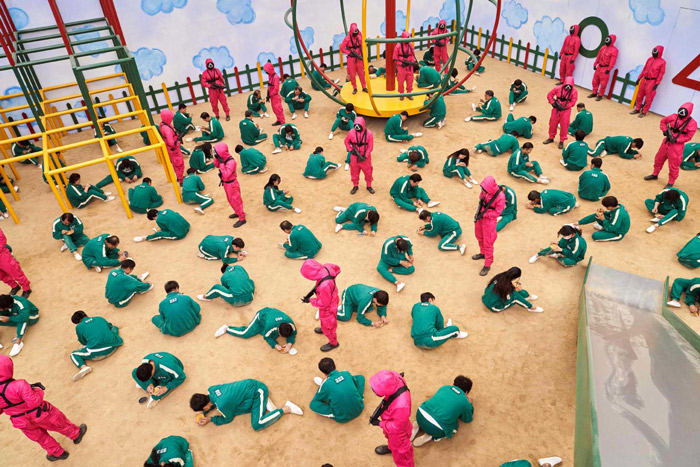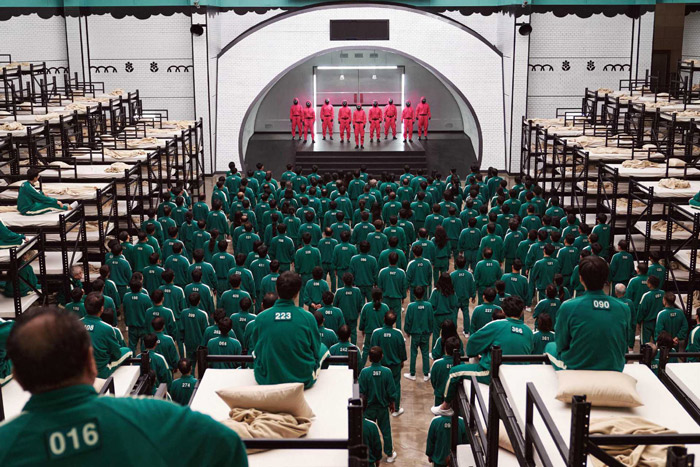现象级韩剧《鱿鱼游戏》曝光韩国平民债务危机 Squid Game lays bare South Korea’s real-life personal debt crisis
中国日报网 2021-10-09 13:43

近日火爆全球的现象级韩剧《鱿鱼游戏》引发了观看热潮,带火了周边产品的销售,也曝光了韩国普遍存在的债务危机。过去几年来,韩国平民负债率不断攀升,贫富差距急剧扩大,许多人都是猝不及防就陷入了债务危机。

After midnight, when the crowds of revellers have gone, Choi Young-soo crouches in a shabby alleyway in Seoul’s wealthy Gangnam district. This is the only time that the 35-year-old, a part-time food delivery rider, dare leave his tiny room at a cheap hostel he shares with about 30 other people.
午夜后,当狂欢的人群散去,35岁的兼职送餐员崔英秀(化名)蜷缩在首尔江南区(富人区)一条破败的小巷里。只有在这个时间崔英秀才敢离开自己和其他30人合住的那个超小的便宜旅店房间。
The rooms, he says, are “only slightly bigger than coffins”.
他说,房间“只比棺材稍微大一点”。
In a fictional world, Choi would not be out of place among the contestants on Squid Game, the wildly popular South Korean dystopian drama that pits the heavily indebted against each other in a macabre, blood-spattered race for an unimaginably large cash prize.
崔英秀的处境和爆款韩剧《鱿鱼游戏》虚构世界中的那些玩家没什么不同。在这部反乌托邦韩剧中,负债累累的人为了巨额奖金加入了一场互相残杀的血腥游戏。
But Choi’s desperate situation is real – he is one of a large and growing number of ordinary South Koreans who find themselves choked by debt, in a country where taking out a loan is as easy as buying a cup of coffee.
但是崔英秀的绝望处境是真实的,他是众多债台高筑的韩国平民中的一员,而且这一人群还在不断扩大。在韩国,借贷就和买杯咖啡一样容易。
"I feel like other people sense that I’m a failure, so I only come out at night to smoke and watch the stray cats,” Choi says.
崔英秀说:“我觉得在其他人眼里我就是个失败者,所以我只有夜里才出来抽抽烟,看看野猫。”
Squid Game, which was released on 17 September, is on track to become Netflix’s most-watched show ever, captivating viewers around the globe with its mixture of dark drama and commentary on the failures of South Korean-style capitalism.
9月17日上线的《鱿鱼游戏》有望刷新奈飞的收视纪录,这部揭露韩国式资本主义地狱的暗黑剧俘获了全球各地的观众。
Household debt in South Korea has risen in recent years and is now equivalent to more than 100% of GDP – a level not seen elsewhere in Asia.
近年来韩国家庭负债率一直在上升,目前已经超过国内生产总值的100%,这在亚洲其他地区都是没有出现过的。
Indebtedness has gone hand in hand with a dramatically widening income gap, exacerbated by rising youth unemployment and property prices in big cities beyond the means of most ordinary workers.
伴随着负债增多,韩国的收入差距也急剧扩大。与此同时,青年失业率的上升和普通劳动者难以企及的大城市房价进一步拉大了贫富差距。
As Squid Game illustrates, a sudden redundancy, a bad investment or simply a run of bad luck can force people to turn to high-risk lenders just to keep their heads above water.
正如《鱿鱼游戏》所描述的,一次突如其来的裁员,一项失败的投资,或者仅仅是一连串厄运,都可能迫使人们求助于高利贷以勉强度日。
The series’ popularity is proof that the misery of crushing debt is a universal experience but, according to Lee In-cheol, the chief executive of the thinktank Real Good Economic Research Institute, its Korean backdrop is far from coincidental.
这部韩剧的火爆证明,债台高筑的苦难是普遍存在的。但是,智囊机构真善经济研究所的总裁李寅哲指出,韩国人陷入债务危机绝对不是偶然。
"The total amount of debt run up by ordinary South Koreans exceeds GDP by 5%,” he says. “In individual terms, it means that even if you saved every single penny you earned for an entire year, you would still be unable to repay your debt. And the number of people with debt problems is rising at an exponential rate.”
他说:“韩国平民的债务总额已经超出了国内生产总值的5%。从个人角度来看,这意味着即使你不吃不喝把一年挣的钱全部省下来,你也无法还清债务。而有债务问题的人口数量正在以指数级速度增长。”
In response, the country’s financial services commission and financial supervisory service recently resolved to prevent more South Koreans from falling into debt. “That is why major banks have acted to curb borrowing,” Lee said. “But is that really going to help people, especially in the middle of the Covid-19 pandemic?”
为此,韩国金融服务委员会和金融监管服务局最近正致力于防止更多韩国人负债。李寅哲说:“这就是为什么大银行已采取限制贷款的措施。但此举真的能帮助人们吗?尤其是在新冠疫情期间?”

Like many of Squid Game’s 456 fictional contestants, who are invited to play Korean children’s games and risk their lives in the process for a 45.6bn won prize, Choi’s plunge into indebtedness came with alarming speed.
《鱿鱼游戏》中456名虚构的玩家受邀来玩韩国儿童游戏,冒着生命危险争夺456亿韩元(约合人民币2.5亿元)的大奖。同这些玩家一样,崔英秀陷入负债也是猝不及防的。
Just two years ago, he was working as an IT engineer for a firm in Pangyo – South Korea’s answer to Silicon Valley. Years of punishing overtime and late nights took a toll on his health. After lengthy discussions and a year spent planning and saving, he and his wife decided to open a pub in their home town, Incheon.
就在两年前,崔英秀还在板桥(韩国版硅谷)的一家公司做软件工程师。多年的辛苦加班和熬夜压垮了他的身体。他和妻子商量了很久并花一年时间进行规划和储蓄后,夫妇二人决定在老家仁川开一家酒馆。
It was a decision they would regret, despite their modest ambitions. “We weren’t hoping to become millionaires,” he says. “We would have been satisfied with earning the same as before. All I really wanted was more sleep … even an extra hour a day.”
尽管他们要的不多,但这是一个会让他们后悔的决定。崔英秀说:“我们不指望成为百万富翁。我们只要挣得和以前一样多就满足了。我真正想要的是多睡一会儿,哪怕一天多睡一个小时也好。”
After an encouraging start, their business fell victim to the coronavirus pandemic. After bars and restaurants were ordered to close as early as 9pm to prevent the virus from spreading, the number of customers reduced to a trickle, then dried up altogether.
生意一开始不错,但很快就受到了新冠疫情的打击。为了防止病毒传播,酒吧和餐厅被要求在晚上9点前关门,客源自此锐减,后来几乎没有了。
"Sometimes we didn’t have a single customer,” Choi says. “It was just the two of us, playing loud music to cheer ourselves up, even though we knew that would mean higher electricity bills. But we couldn’t switch it off.”
崔英秀说:“有时候我们一个客人也没有。酒馆里只有我们两个人,把音乐开得震天响,就为了让自己好过一点,尽管我们知道这样做会增加电费。但是我们就是没法关掉音乐。”
After failing to pay their rent for four months, the couple knew they were testing their landlord’s patience and sought help. Securing a bank loan was surprisingly easy, but they were shocked to find the interest was a steep 4%.
在拖欠店铺租金四个月后,这对夫妇知道房东也等不起了,于是就向银行寻求帮助。没想到贷款非常容易,但是他们震惊地发现利率高达4%。
Within months they had taken out loans from all five of South Korea’s high-street banks, using their home as collateral. Inevitably, they had to borrow more to pay off existing loans, joining long queues of troubled business owners eager to secure cash from commercial lenders at interest of more than 17%.
几个月内,他们就用自己的房产做抵押借遍了全部五家韩国高街银行。为了偿还现有的贷款,他们不可避免地要向银行借更多钱,最后他们跟其他深陷困境的企业主一样,排队申请利率超过17%的高息商业贷款。
"By then, I no longer cared about how high the interest rates were,” Choi says. “I was getting so many calls and text messages demanding that I repay my loans. It took over our lives. My wife said she even heard me muttering about interest rates in my sleep.”
崔英秀说:“那时候,我已经不在乎贷款利率有多高了。我每天都接到很多电话,收到很多短信,催我还贷。债务已经占据了我们的生活。我的妻子说,她甚至听到我在睡梦中念叨利率。”
In a desperate attempt to pull themselves out of their downward spiral, Choi’s wife found a job at a restaurant in another part of the country, and the couple asked his parents to look after their two young children.
绝望中,为了摆脱这一恶性循环,崔英秀的妻子在韩国另一个地方找到了一份餐厅的工作,夫妇二人还拜托男方父母帮忙照顾两个小孩。
Choi says he has heard a lot about Squid Game, but is unable to become part of the global frenzy that has helped the nine-episode show amass tens of millions of viewers.
崔英秀说,他经常听说《鱿鱼游戏》这部剧,但是无法成为全球追剧大军中的一员。这部9集韩剧已经吸引了数千万观众。
"You have to pay to watch it and I don’t know anyone who will let me use their Netflix account,” he says. “In any case, why would I want to watch a bunch of people with huge debts? I can just look in the mirror.”
崔英秀说:“这部剧必须付钱才能观看,我也不认识能让我借用奈飞账户的人。再说了,我干嘛要看一堆负债累累的人?我自己照照镜子就好了啊。”
英文来源:卫报
翻译&编辑:丹妮

















 英语点津微信
英语点津微信 双语小程序
双语小程序